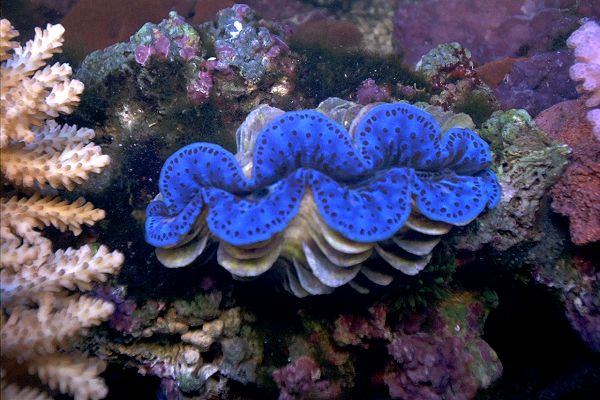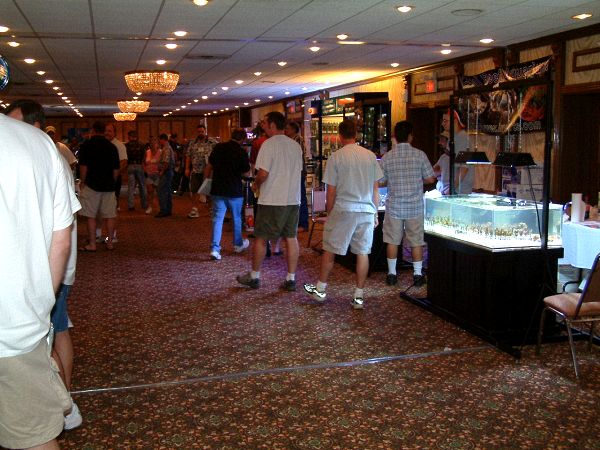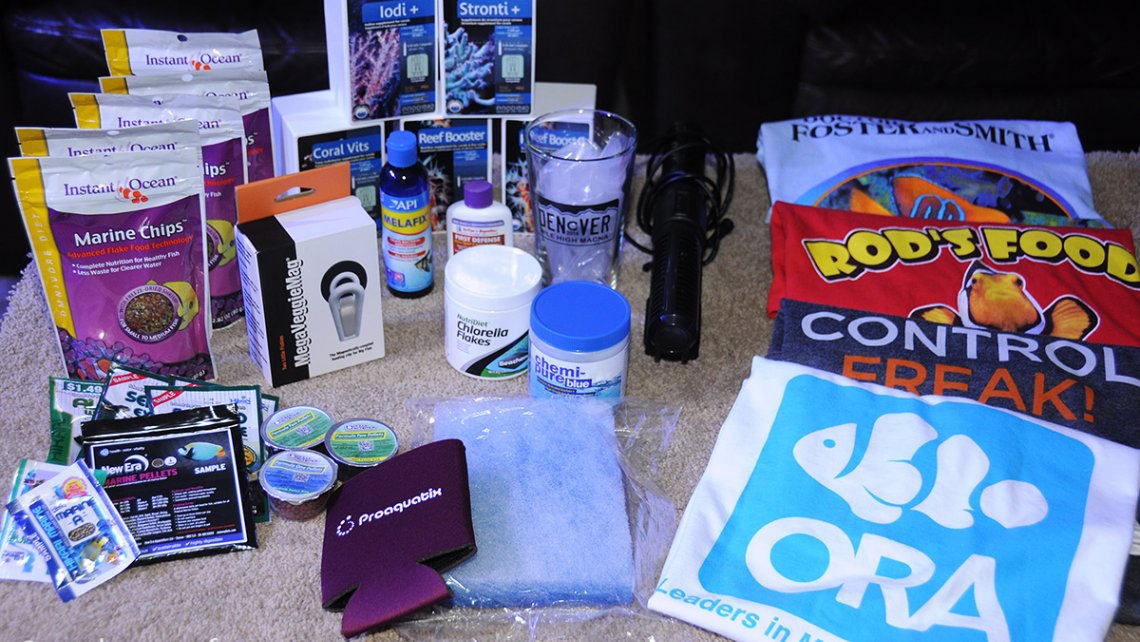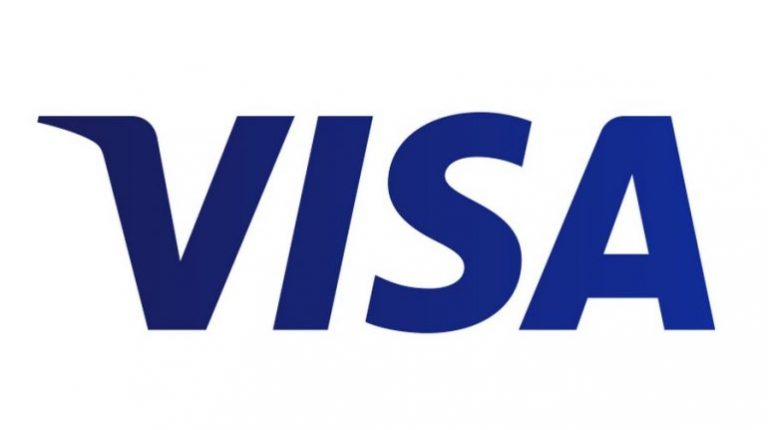What is MACNA? Why should you attend?
That is the question I asked myself a few years ago, back in 2002. I saw the brochure at the LFS (local fish store), and heard some people talking about it, but I wasn't sure what it actually was. One thread on ReefCentral asked "Who's going to MACNA this year?" and so I finally replied that I wanted to know what it was all about. Duane, one of members of DFWMAS, chimed in that it was being held in Ft Worth, and that I would love it. Skeptical, I decided to do more research. I followed a few older threads and a couple of links that lead me to an old newsletter that was written by Nancy Swart, then president of MASNA. In that newsletter, a previous MACNA (Marine Aquarium Conference of North America) was described somewhat, and as I scrolled down I found her phone number listed. I promptly called her up to talk to her about this event that she so obviously loved to attend, and asked her "Why should I go?" Although she protested that she was not the one to be asked, I pressed her for more details because if she loved it that much, she'd be the perfect person to convince me to part with my money.
Yes, that's right. MACNA isn't free, even when your own club sponsors it. Entry fees vary, depending upon when you sign up to attend, and where it is located that year. MACNA XIV was hosted by DFWMAS in 2002, and when I was told it cost $150 to attend, I felt that money would be better suited for more Live Rock or toward an upgrade of my lighting. $150 is a lot of money to most people! Duane and others continued to answer my questions and objections patiently, and I attended my first conference. It was fantastic. I soaked up information from one speaker after another over the three-day conference. We were in a nice air-conditioned hotel, meeting in a very large room filled with tables and chairs facing a stage with a speaker podium and two huge projection screens.
Topic after topic was discussed, most of them going right over my head. Prior to this, all I had was some online help, with the majority of my information coming from the LFS near my home, and that wasn't a lot. Lighting, a very important topic,was discussed in depth, including what was the best ballast and bulb combination as well as which reflectors did the best job. Ron Shimek discussed the downfalls of DSBs, painting a very sad picture indeed. Various ideas were presented by Martin Moe and Steve Tyree regarding multi-zoned tanks, via slides or video. Speaker after speaker was introduced, but I had no idea whom any of them were. Many of these speakers were published, and buying their book(s) is beneficial to anyone in the hobby. But hearing them discuss their findings, and then having the opportunity to ask questions during the 30 minute Q&A period was priceless. Hearing other people's questions answered, I quickly learned more and more. I raised my hand a number of times, eager to fill in the blanks that had formed in my own mind. One of the best moments was the 'round table discussion' with several speakers collectively answering questions posed by the audience. In this way, you could learn several points-of-view as the speakers themselves disagreed on various topics with one another, yet it would always end on a good note or a laugh.
Saturday evening, a banquet is held with a special talk. In this case, Walt Smith came with a great video presentation that we viewed after a delicious meal was served. We saw how the LR was made and placed in the ocean for months at a time, preparing it for our tanks. We saw how corals were harvested and fragged, then placed back in the ocean to create new corals for importation later. One colony would make 40 frags, later to be 40 corals sold in the U.S. We saw how the divers in Fiji lived and worked.

Throughout the conference, many vendors were on hand with their products that could be purchased or ordered. Lighting of all kinds was displayed and explained, pumps were demonstrated (I hung out at the Tunze booth entirely too long, but it was fascinating!), corals & clams & frags were available, dry goods and gizmos and books of all kinds... New products and curious items were on hand, such as the circular tank that rotated 360° with a round sump built into the base... I bought my first SPS corals and my Blue Maxima Clam there. I took a lot of pictures at that conference. Barry, the club webmaster, assembled a huge slide show on DFWMAS' site that you can enjoy for probably an hour. If you want to see more, the entire conference is available on DVD.
Between sessions, breaks would be provided to allow us a chance to stretch our legs and meet one another. Often various authors or speakers were surrounded by fellow hobbyists asking questions or relating experiences, or just talking about whatever. Lunch was about an hour long, and we had the choice to leave and eat out, or enjoy the hotel's 'Box Lunch' that they offered daily at the pre-arranged rate ($10). The hotel did a fantastic job keeping all of us happy, and there were probably about 500 in attendance. Evenings, those that wished could stay late and visit around the pool, munching on snacks and drinking all kinds of beverages served at the bar. Many people look forward to meeting their online friends, or rejoining the friends they made at a previous MACNA.

One of the biggest draws for many is the raffle. All the vendors contribute various pieces of equipment or livestock, and everyone has the opportunity to buy some raffle tickets to win. The grand prize at MACNA XIV was a 120g Starfire setup worth $4000!!! Man did I want that tank. It was filled with about 40 clownfish of differing types, a nice pile of LR, an abundance of frags, macro algaes, sump, refugium, stand & canopy, and PC lighting. I was very very tempted to just buy $500 worth of tickets to win that tank, but finally didn't do it. Instead, a guy from Florida won it, and when he got home his girlfriend put her foot down and he didn't keep it. MAN!
I had a wonderful time, so much so that I attended the next MACNA in Louisville, Kentucky a year later. If you'd like to see that conference, visit this page on my site. Tons of seahorses were available that year! Also, I got to participate in a coral propagation workshop that Anthony Calfo offered, learning how to frag corals properly. Before leaving, I'd signed up to attend the next year's MACNA in Boston, MA.
Many people come to me on a regular basis asking me questions about this hobby, and I am always happy to help. But where do you think I'm getting all my information? Books, online forums, and club meetings are good, but MACNA is where the majority of my information comes from. Each speaker discusses their topic for about 45 minutes, and that coupled with their visual presentation provides the hobbyist with an arsenal of information. Over the three day conference, 15 to 18 different subjects will be tackled, and I guarantee you that you will not walk away with any regrets. There is so much to learn, and new things are being studied and applied to this hobby which keeps us moving forward with greater success in sight..
MACNA wasn't created for the clubs as a status-symbol. It wasn't created for the vendors to make money. It was created for the hobbyist, and if you are skipping the opportunity to attend year after year, you are only short-changing yourself. Not only will you be able to help others more -- your reef tank will benefit greatly as you will have a greater understanding of how things work and what to expect from a variety of livestock. Make plans now to attend the next MACNA!
Would you like more information? Here are two more articles: MACNA Mania MACNA Summary (PDF)












